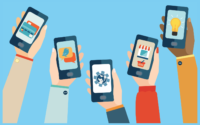
Download Report: Mobile Technology and Home Broadband 2019
37% of Americans now go online mostly using a smartphone, and these devices are increasingly cited as a reason for not having a high-speed internet connection at home Pew Research Center
Premier Portal for Professionals Since 1995, Covering Technology-Based Education

37% of Americans now go online mostly using a smartphone, and these devices are increasingly cited as a reason for not having a high-speed internet connection at home Pew Research Center

This paper examines how in a resource constrained context, access to personal mobile devices for first year university students increases their flexibility of learning and creates a environment of greater inclusivity at University. In 2016, at the start of their first year 201 students in an extended degree program in the Humanities at the University […]

Researchers at Stanford have shown that a relatively new technology – a chatbot they dubbed “QuizBot” – can be significantly more effective than flashcards in helping students learn and retain information. Stanford University
Beacon technology was developed by Apple in 2013, and its initial use in secondary education has generated much enthusiastic descriptive and web-based claims of its potential. However, not only is there a paucity of academic study on its use in the classroom, but none of these claims have been critiqued. Additionally, if teachers are to […]

Teachers and learners in all sectors of education continue to have access to a growing number of mobile augmented reality (AR) applications for the creation and implementation of mobile AR experiences and learning objects (LOs). In this study, affordances of mobile AR and LOs for higher education are investigated through the mobile AR platform HP Reveal. […]

Issues relevant to smartphone-supported mobile learning have been extensively discussed and investigated over the past years. Unlike general mobile devices, the advantages of smartphones, such as recording learning and portability, can cross formal and informal education. Smartphones can promote communication between health professionals; however, there is still a lack of systematic analysis of the application […]

Students’ understanding and integration of information literacy (IL) skills are fundamental to higher education and lifelong learning. Development and implementation of thirteen mobile lessons application (http://renmil.ca/ ) in the Mobile Information Literacy Tool (MIL) was the result of a unique collaboration between faculty and the library. Lessons demonstrated how to locate, evaluate, and use information […]

Scholarly literature on education technology uptake has been dominated by technological determinist readings of students’ technology use. However, in recent years there has been a move by sociologists of education to highlight how the contexts in which educational technologies are introduced are not tabula rasa but socially and culturally complex. This study approaches technology as […]